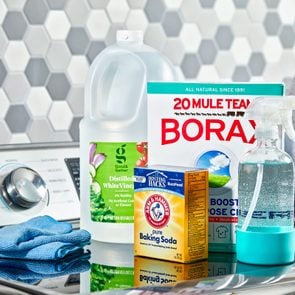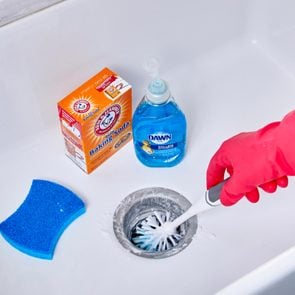Does Bleach Expire? Here’s What You Need to Know
Updated: Apr. 18, 2024
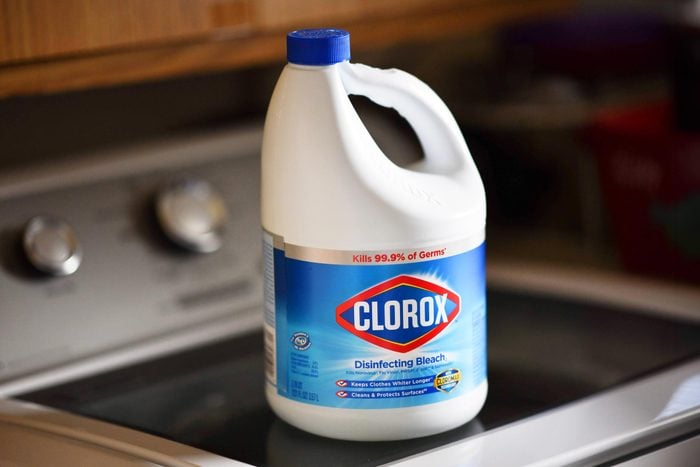
That bottle of bleach you’ve had forever may not be as powerful as it once was. Cleaning experts weigh in on whether bleach has an expiration date.
We used to be a no-bleach household. I didn’t like the idea of having such a caustic chemical around my kids, and the smell was just so strong. But when the pandemic hit, everything changed. I wanted a disinfectant I could count on, so I bought a bunch of bleach and learned how to clean pretty much everything in the house with it. Post-pandemic, I’ve calmed down a bit, but I still have a pretty big reserve of it. Catching sight of it in my garage the other day, though, I started wondering: Does bleach expire? And if so, how can I tell if mine has?
Even though I’ve been writing about cleaning for more than a decade, I didn’t know the answer to these questions. According to the National Institutes of Health, bleach’s disinfecting power comes from its active ingredient, sodium hypochlorite, which is “effective in killing bacteria, fungi and viruses, including influenza virus.” Because of this, I especially like using bleach to clean my kitchen and bathrooms—but I’m expecting it to work, of course.
To make sure I wasn’t “disinfecting” with something that had lost all power to do so, I spoke with three experts—two chemists and Clorox’s in-house scientist and cleaning expert. Ahead, you’ll find out whether bleach expires and how to tell if there’s a problem with your favorite bottle of disinfectant.
Get Reader’s Digest’s Read Up newsletter for more cleaning, tech, travel, humor and fun facts all week long.
About the experts
Reviewed for accuracy by: Ann Russell, TikTok’s “cleaning auntie” and the author of How to Clean Everything. |
Does bleach expire?
Yes, bleach expires—and you might not have as long as you think to use it. The shelf life of bleach is generally only around 6 months to a year, according to Erika Womack, PhD, the state chemist for Mississippi and the director of the Mississippi State Chemical Laboratory. After that, bleach starts to degrade, becoming 20% less effective each year. And that’s only if the bleach is stored properly. If not, you’re looking at an even shorter shelf life. Surprised? I definitely was.
Once bleach is past its prime, its main component, sodium hypochlorite, naturally breaks down into what is essentially salt water, says Mary Gagliardi, Clorox’s in-house scientist and cleaning expert. This applies to both opened and unopened bottles, and it will happen no matter how the bottle is stored. While expired bleach won’t be quite as innocuous as regular salt water for a while, it also won’t have the full disinfecting or whitening power that it has before its expiration date. So much for my bleach stockpile!
Signs bleach has expired
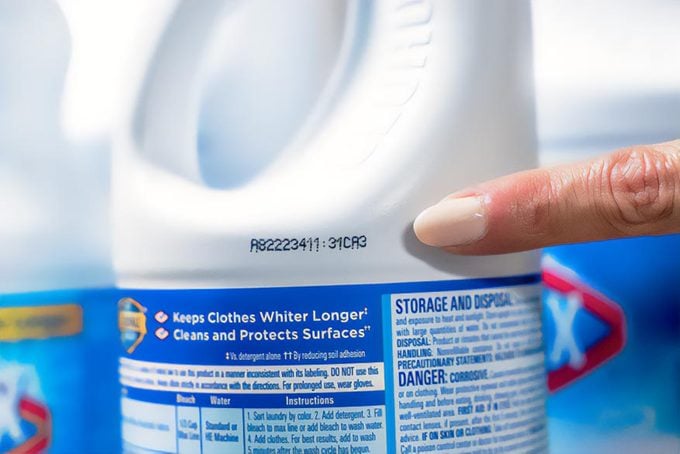
If you want to make sure your bleach is at its full potency, you’ll need to do a little detective work. Some of the ways to tell if your bleach is still good involve label-checking, but others are a little more intense. Since bleach is a powerful chemical, make sure to heed the warnings below if you decide to inspect it.
- The production code indicates that your bottle is more than a year old. This is the most straightforward way to tell if your bleach is still good, and according to Gagliardi, it should always be your starting point. Reading the stamped date, however, takes a bit of know-how. Instead of expiration dates, bleach bottles are stamped with production codes, which tell consumers when a bottle was produced. You can decipher the precise production code following Clorox’s detailed instructions in conjunction with this Julian date converter. Or, if you just need to know the year, it’s the third and fourth numbers on the stamped code.
- It’s been longer than one year since you bought your bleach. If you know you bought your bleach more than a year ago, there’s no need to decipher the production code. If it’s been more than a year, your bleach has expired.
- Its color has changed. Since bleach comes in an opaque bottle and this is how you should continue to store it, you won’t notice this until you pour out some bleach. It’s normally a very light yellow, but I’ve noticed that it can turn much darker over time.
- It doesn’t smell anymore.* “If you can’t detect any bleach odor when using the product as directed and your bottle is less than a year old, then it’s likely that the sodium hypochlorite active has degraded below the concentration needed for sanitizing or disinfecting applications,” says Gagliardi. “At this point, the bottle should be replaced.”
*An important safety note: You should never intentionally inhale bleach or other chemicals. “Inhaling bleach fumes can irritate the respiratory system, cause headaches and, in extreme cases, lead to more serious health issues,” says Womack. Instead of opening your bleach bottle and taking a whiff, which you definitely shouldn’t do, investigative scientist Alexis Rochester recommends a technique called “wafting”—but only if you’ve been trained to do this. “Holding the solution far away from your nose, you use your hand to gently waft or wave the fumes toward your nose,” she says. “But if you don’t have experience with this, I don’t recommend it.” That said, if you’re using your bleach and don’t smell anything when you open the bottle, it’s safe to assume it’s past its prime.
The best way to store bleach
While incredibly powerful, bleach is also surprisingly delicate. It doesn’t like extreme temperatures or direct sunlight, for starters. And as Gagliardi notes, storing it improperly will speed up the breakdown process, “causing the bleach active concentration to drop below the level needed for EPA-registered disinfecting and sanitizing uses.” Here’s the ideal storage situation for bleach:
- Keep it somewhere cool and dry. According to Womack, temperatures between 50 to 70 degrees Fahrenheit are best. Humidity or other moisture is the enemy here, as is a spot that’s too cold. In the summer or in hotter climates, says Gagliardi, avoid storing bleach in any part of your home that isn’t climate controlled. Translation: Don’t keep it in a too-hot or too-cold garage. An interior closet or cabinet in your home is a better bet. (Just make sure it’s out of reach of children.)
- Opt for a dark storage spot. Bleach should not be exposed to sunlight, which accelerates the breakdown process as well. You’ll also want to mix fresh bleach solutions each time you need them. Bleach stored in a clear plastic spray bottle, for instance, will degrade much faster than bleach that’s properly stored in the opaque container it comes in, since that container naturally keeps bleach in the dark.
- Write a “use-by” date on the bottle. Since bleach bottles come stamped with a production date that needs a bit of decoding, it’s a whole lot easier to write your own estimated date on the bottle with a permanent marker. That way, you and anyone else who reaches for it will know when it’s no longer good for disinfecting purposes. This is what I do with new bottles of bleach whenever I purchase them.
FAQs
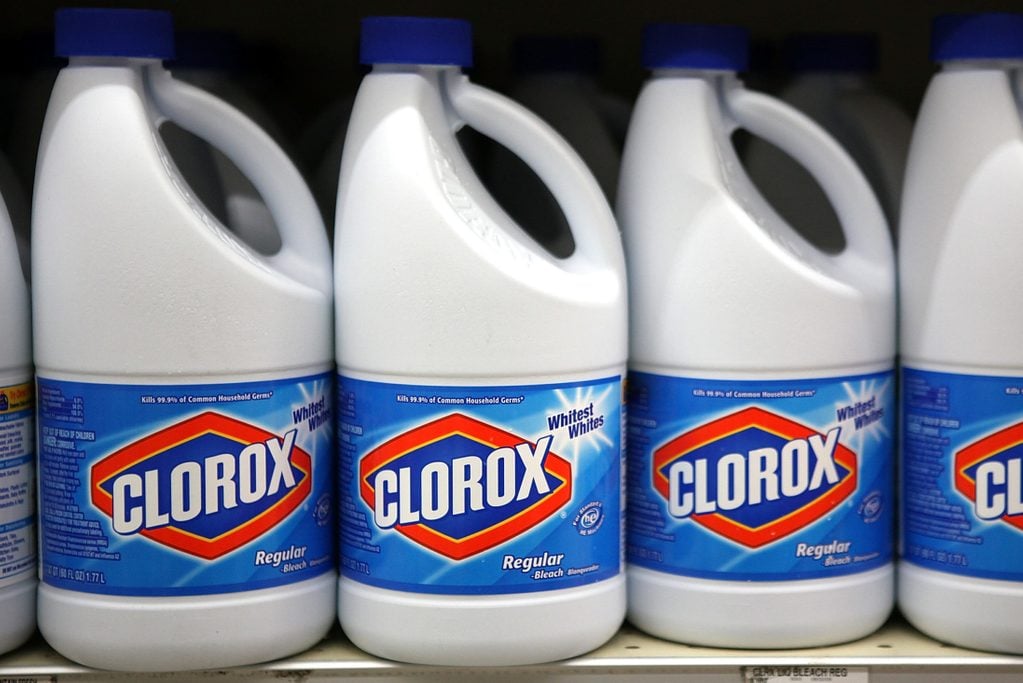
Is it safe to use expired bleach?
Yes, it is safe to use expired bleach. It does not turn toxic after its expiration date—but it does become less effective, so you can’t count on it to sanitize items like water bottles or door knobs. But “while you can’t use expired bleach for sanitizing or disinfecting, you can use it for basic cleaning tasks, like cleaning toilets,” says Gagliardi. Cleaning with expired bleach is the same as cleaning with salt water.
What’s the best way to dispose of expired bleach?
The best way to dispose of expired bleach is either down a household drain (diluted) or through your municipality’s hazardous-waste disposal program. It depends on local regulations, as well as how much of it you have, says Womack. Some cities consider bleach a hazardous waste, and regardless, you’ll want to take larger amounts to your local hazardous-waste facility or pickup event.
That said, you can also still use expired bleach for regular cleaning tasks. “This is my favorite way to quickly get rid of expired bleach,” Gagliardi says. “Just add a little to the toilet bowl and then give it a quick scrub with a toilet brush before flushing.”
Why trust us
At Reader’s Digest, we’re committed to producing high-quality content by writers with expertise and experience in their field, in consultation with relevant, qualified experts. For this piece on bleach expiration, Shifrah Combiths tapped her experience as a home expert with 10 years covering home and cleaning, and then Ann Russell, TikTok’s “cleaning auntie” and the author of How to Clean Everything, gave it a rigorous review to ensure that all information is accurate and offers the best possible advice to readers. We also relied on reputable primary sources, including cleaning and health experts and government agencies. We verified all facts and data and backed them with credible sourcing, and we will revisit them over time to ensure they remain accurate and up to date. Read more about our team, our contributors and our editorial policies.
Sources:
- Mary Gagliardi, in-house scientist at Clorox; email interview, Jan. 8, 2024
- Erika Womack, PhD, Mississippi State chemist and director of the Mississippi State Chemical Laboratory; email interview, Feb. 26, 2024
- Alexis Rochester, investigative scientist and founder of Chemistry Cachet; email interview, Jan. 11, 2024
- National Institutes of Health: “Use of disinfectants: alcohol and bleach”
- Wittenberg University: “Handling Chemicals”


